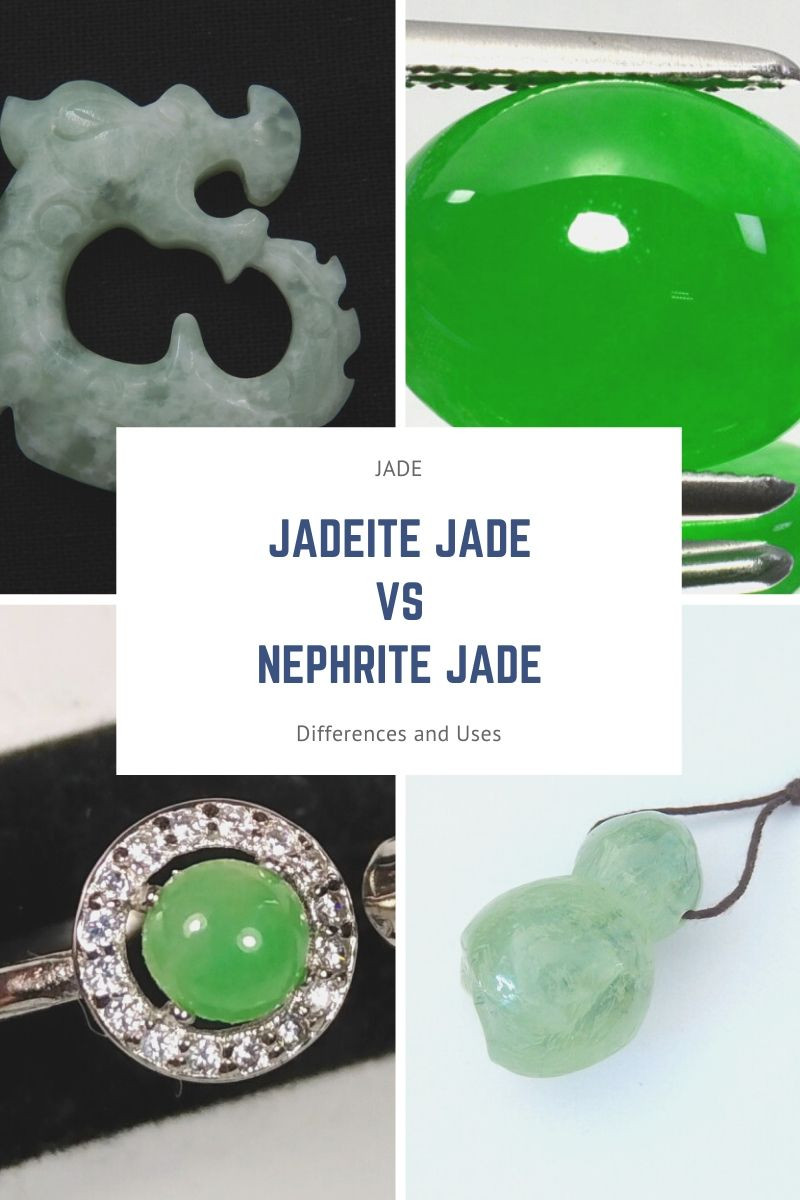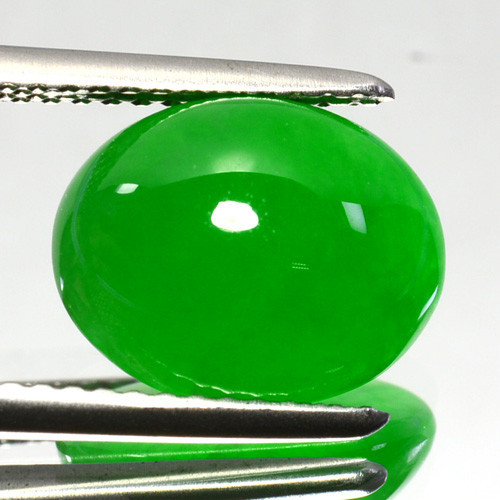
What Is The Difference Between Nephrite Jade and Jadeite?
 What's the difference between nephrite jade and jadeite? Excellent question!
What's the difference between nephrite jade and jadeite? Excellent question!
If you were to hold a piece of jadeite in one hand and a piece of nephrite jade in the other, would you be able to tell the difference between them? If not, no worries, because most people can't! Nephrite jade and jadeite were considered the same gem until 1863, when French mineralogist, Alexis Damour, discovered that the two stones were chemically different.
Both gems are the signature shade of green we know and love about jade, but there are key differences upon closer inspection.
Jadeite is one of the oldest and most sought after gemstones in the world, and while nephrite jade is highly popular, it does not garner the same level of commercial value.
And that’s only one difference — we’ve got lots more to cover about the difference between jadeite and nephrite jade, so keep reading!
What is Jadeite?
Like diamonds, jadeite forms exclusively in metamorphic rocks exposed to the intense pressures deep below the Earth's surface. Buried beneath all this heat and pressure, jadeite only comes to the surface in regions where there's erosion or shifting of tectonic plates.
Which countries supply jadeite?
Jadeite exists in many places around the globe, including:
All over Kazakhstan
Near the mountains of Omi and Kotaki Japan
Along the Motagua River Valley of Guatemala
In San Benito County, California
The Ural Mountains in Russia.
However, the largest and most profitable source of jadeite is Myanmar (formerly Burma). Experts estimate that 70% of the world's jadeite supply comes from Myanmar's mines.
In other words, if you're ready to get your hands on jadeite, Myanmar is a great source!
What about nephrite jade? Let's explore how it forms, what it is, and where the gem comes from around the world.
What is Nephrite Jade?
Nephrite jade is also formed in metamorphic rocks but undergoes much less pressure and stress than jadeite. Because of this, nephrite jade is much softer than jadeite.
Because it's naturally closer to the Earth's surface, nephrite jade grows in deposits worldwide. One of the primary sources is New Zealand, where it adorns riverbanks and seashores.
Deposits of nephrite jade also come from:
Australia
Brazil
Canada
Sinkiang China
Russia,
Taiwan
Zimbabwe.
Alaska, where it has the honor of being named the state's official gem!
Difference Between Nephrite Jade and Jadeite: Color
The easiest way to tell the difference between jadeite and nephrite jade is by color.
You're probably most familiar with the green color of jadeite, but this gemstone comes in almost every color of the rainbow. Jadeite can be white, pale apple-green, pink, lavender, and even dark blue. Of course, the highest valued color is the deep green known as "Imperial Green."
Fun fact: red jadeite commonly gets confused with the infamous Burmese Ruby, thanks to its similar color and high-quality.
Nephrite jade comes in a variety of colors, too, including dark to light green and even black. Due to its high level of magnesium, nephrite jade can also be translucent white to a very light yellow, known in China as "mutton fat jade."
Nephrite Jade Vs. Jadeite Uses
For centuries, both jadeite and nephrite jade have served a variety of purposes across cultures and societies! If you follow popular beauty trends, you probably have a facial roller made of nephrite jade sitting in your bathroom right now!
If you can believe it; long before jade smoothed wrinkles and massaged skin, it was weaponized.
Weapons were probably the earliest uses of these minerals. Neolithic ax heads made of jadeite have been found all over the British Isles, and Maori warriors made small clubs known as mere, out of nephrite jade.
In the 2008 Beijing Olympics, the Chinese government mounted nephrite jade into the bronze, silver, and gold medals. Can you believe that it was the first time in the history of the games that gemstone materials adorned Olympic medals? Pretty neat!
So, if they're good enough for Olympic medals, they must be worth a pretty penny, right?
In some cases, yes, although most commercially bought and traded jade is relatively low in value. But there are exceptions!
The most expensive jadeite item ever sold is the Hutton-Mdivani Necklace. The necklace, owned by Woolworth heiress Barbara Hutton, is made of 27 emerald green jadeite beads and has a clasp set with diamonds and rubies. In 2014, the necklace sold for $27.4 million.
Diamond's might be a girl's best friend, but it looks like jadeite is an heiress's!
Jadeite and Nephrite Jade's Metaphysical Properties
Physical Healing
Nephrite jade's name comes from lapis nephriticus, the Greek word for "nephros," which means "kidney." Nephrite jade was often found in round pebbles that were a similar shape to human kidneys, hence the name.
Because of this, people believed it had the power to heal various sorts of stomach ailments, including kidney stones and menstrual cramps,
Similarly, jadeite's name comes from the Spanish phrase "piedra de ijada," which means "stone of the side." It was a common practice in Central American indigenous communities to hold a piece of jadeite against their sides to cure back pain and kidney issues.
Good Fortune
Both jadeite and nephrite jade are considered "good luck" stones, most likely because their green coloring reminds people of cash. Many people believe that if you want to attract wealth, you should always carry a piece of jade with you (either kind will do!).
Positive Energy
Did you know that jade is a healing crystal? That's right! Both stones help to stabilize emotions and instill calm in challenging situations. They are often used to dispel negative energies so that more positive and uplifting ones will flow in and take their place.
Key Differences Between Nephrite Jade and Jadeite
As you can see, there are similarities and differences between these two beautiful gems. Do you think you could tell the difference between jadeite and nephrite jade now? If not, don't worry, here's a quick recap:
Nephrite jade is more common and widely used, but Jadeite is more rare and valuable
Jadeite is harder, with a Mohs ranking of 6.5-7, compared to Nephrite’s score of 6-6.5
Chemically, nephrite is made from calcium magnesium iron silicate, while jadeite is composed of sodium aluminum silicate (making it harder)
SHOP FOR JADE
Search the Gemstone Encyclopedia
Related Auctions
Related Articles
Azotic treatment of Topaz and Quartz is a treatment that creates a layer of color over a gemstone. Learn more about this treatment and check out our stones fro sale.
8th May 2018
There are dozens of quartz and chalcedony gems with various colors and patterns. Learn all about quartz properties and every type of quartz, from amethyst and agate to plasma and phantom quartz!
15th Oct 2020
Quartz and Topaz are two of the most common minerals on the planet. They also look very similar. Let's look at some properties of them and compare Quartz and Topaz.
23rd Oct 2018
Latest Articles
Yugawaralite is a rare colorless, white, or pinkish zeolite crystal named for its discovery in Yugawara, Japan. Here we uncover the multifaceted history, properties, prices, and uses of yugawaralite.
24th Mar 2025
Simpsonite is a lesser-known mineral known on the gem market for its durability, yellow-orange color, and rarity. Discover all the properties, uses, prices, and history of simpsonite.
3rd Mar 2025
Kurnakovite is a colorless crystal related to inderite and rarely faceted but known among collectors. Explore the mineral traits, history, prices, and more in this kurnakovite guide.
17th Feb 2025
Article Categories
How To's is where you will find helpful articles from gem Rock Auctions on how to cut gemstones, select gemstones and buy gemstones.
9 Articles






